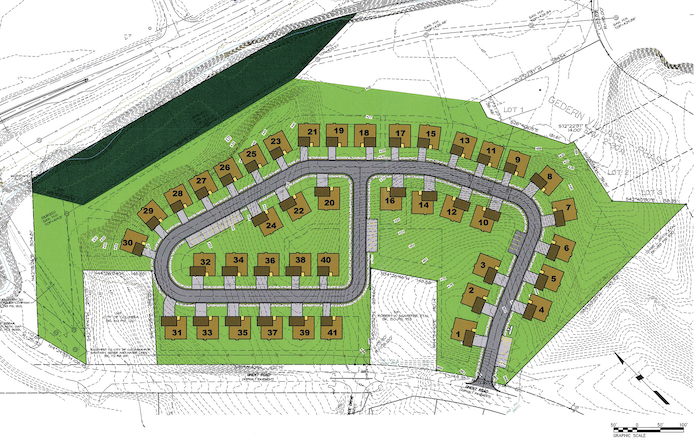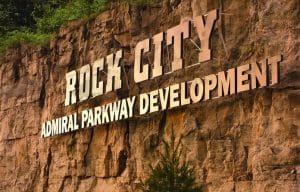Columbia approves condos, talks ‘mobile vending’

Pictured is the layout of a community unit plan for North Point Villas, a condominium development in northern Columbia approved at last Monday’s Columbia City Council meeting
Despite pushback from two aldermen and a resident of Gedern Village, the Columbia City Council approved a community unit plan for a proposed condominium development along the 1700 block of Ghent Road during its Nov. 20 meeting.
With a 6-2 vote, the council approved the overlay plan for North Point Villas, a 41-unit phased development which includes variances in street width and setback requirements.
Ward IV Alderman Steve Holtkamp and Ward III Alderman Jeff Huch voted against the community unit plan.
Before the vote, Gregory Grohman spoke during the public input portion of the meeting in opposition to the condo development.
He said he was speaking as a 22-year resident of Gedern Village, not as an official representative of the subdivision, but added he had spoken with other residents in the area who shared his concerns.
“Putting in this particular development, we believe, is a little bit problematic because calling it a condominium development is not the same as calling it a residential subdivision,” Grohman began, explaining the distinction could allow developers to build anywhere within a “building area” and not in prescribed lots as required with subdivisions.
“We’re concerned about the juxtaposition to the front three lots of our subdivision, because (the proposed building areas) back right up to them,” Grohman continued.
He also expressed concern with the number of structures allowed in the proposed “cluster development” and how it might affect the aesthetics of the northern entrance to Columbia as motorists enter on Route 3 from I-255.
“You’re going to come into the City of Columbia and you’re going to look off to your left through your windshield and you’re going to see houses on top of each other,” Grohman said.
“I just want (the city council) to understand we’re concerned with the appearance on the city, and we want things to look consistent with the rest of northern Columbia,” he concluded.
During discussion of the agenda item, Holtkamp recapped comments he made during the Nov. 6 meeting.
“I do want to reiterate my thoughts on the fact that the zoning is not being met at all in the subdivision,” Holkamp said.
He also said he was contacted by residents in response to an article in the Nov. 8 issue of the Republic-Times.
“One person said, ‘If you don’t follow the rules, you don’t need the rules,’” Holtkamp said, adding, “I tend to agree with him. So as far at setbacks, street widths, sidewalks, I think we need to have the owner reconsider some of these issues, because I can’t support that.”
Huch asked a representative of Sunset Ridge Enterprises, the development company for North Point Villas, what benefit the city has by approving the community unit plan.
The representative explained the cluster development design contains the same amount of buildings as would a development following city guidelines, but the perimeter of the housing area would be “pushed out further” and more land grading would be required.
Columbia Building Official Justin Osterhage also added improvement plans would be submitted prior to final plat approval.
In other business, the council approved an ordinance establishing city employee guidelines regarding paid leave accrual to conform to the recently passed Illinois Paid Leave for All Workers Act which goes into effect Jan. 1, 2024.
Columbia City Administrator Doug Brimm explained the law has been interpreted to allow municipalities to pre-empt the act by setting their own ordinances before the new year.
The main change will allow paid leave accrual before a full year of employment at a rate of 1.54 hours per week with a maximum of 80 hours of accrual in the first four years of employment.
City Attorney Terry Bruckert spoke negatively about the new law, saying many members of the Illinois Municipal League as well as private businesses were upset at what is being perceived as union lobbyists “digging in” to create a law which will hurt employers.
Bruckert also expressed displeasure at the fact municipalities were not exempt from the new law.
He explained the passage of the new paid leave ordinance in Columbia is “the best way to amend our rules so the two laws coincide and the taxpayers don’t get hammered in the process,” adding he expects modifications in the next few years regarding seasonal employees.
In new business, there was a discussion about amending city code to provide official guidelines for “mobile vendors.”
The three proposed amendments would repeal and replace the existing “food truck” licensing language using the term “mobile vendor” and establish development standards for mobile vending business “parks” and rules for vending “premises” in Columbia.
The draft ordinance was created in response to the increased popularity of food trucks and other mobile vending businesses, according to the agenda item report.
The report also states “recent interest in developing a mobile vending park in conjunction with an entertainment venue.”
The city code would also need to be amended to include a section establishing use of a structure as an indoor entertainment venue in a BP-2 business park zone.
While the city currently has “food truck” regulations, there are no guidelines regulating a possible “mobile vending park,” which would only be allowed in a BP-2 district per the current draft ordinance.
Osterhage also asked for guidance in drafting parking regulations for a mobile vending park or an indoor entertainment venue.
The topic will be discussed at a future council meeting.






